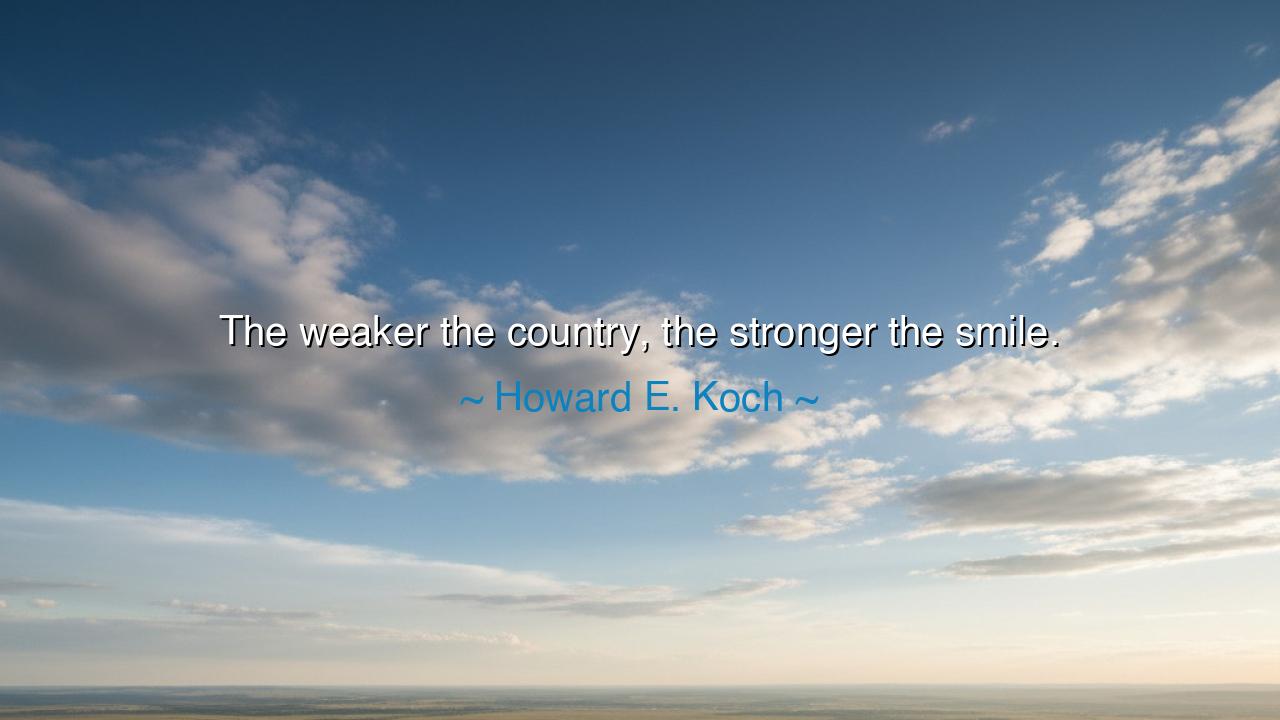
The weaker the country, the stronger the smile.






In the words of Howard E. Koch, the writer who gave voice to timeless tales of struggle and human dignity, we hear a profound paradox: “The weaker the country, the stronger the smile.” At first hearing, this may seem a riddle. Why should weakness breed a stronger smile? But within this saying lies an ancient truth—that nations, like men, often conceal their fragility with gestures of warmth, and that the art of survival sometimes depends not on the clenched fist, but on the disarming power of the lips curved upward.
To understand this, one must see that the smile is both a shield and a weapon. For a nation lacking in armies or resources cannot afford to bare its teeth in defiance. Instead, it must cloak its insecurity with charm, winning allies through courtesy, disarming rivals with grace. The stronger the adversary, the brighter the weaker must smile. This is no empty gesture; it is strategy, born of necessity, as old as the councils of kings and the treaties of emperors.
History offers many examples. Consider the small city-states of Renaissance Italy. Florence, fragile amid greater powers, wielded diplomacy with the same brilliance it wielded art. Its ambassadors were famed for their eloquence, their courteous gestures, their radiant smiles, which softened the ambitions of stronger neighbors. Though Florence lacked vast armies, it endured through wit and charm, proving Koch’s words true: where power falters, grace must be doubled.
Or recall Poland in the 18th century, weakened by division and threatened by larger empires. Its leaders sought not only to defend their land by arms but also to appeal through treaties, alliances, and the soft words of diplomacy. Their smiles were not signs of naivety, but of necessity, a way to delay conquest and preserve what could still be saved. Though the nation faltered in that century, its people survived—because beneath every forced smile burned the flame of identity that could not be extinguished.
Yet Koch’s wisdom is not only for nations but also for individuals. In life, when one finds oneself without strength, without influence, without position, the smile becomes a lifeline. It bridges gaps, soothes hostility, and wins time for the weary to gather strength. Many who seem powerless survive because they know how to wield the quiet force of goodwill, turning potential enemies into unexpected allies. The world, after all, is often moved less by threats than by the strange disarming power of human warmth.
But there is also warning in this quote. A strong smile from a weak country may hide desperation, or cloak a struggle that should not be ignored. It teaches us to look deeper than appearances, to ask what lies beneath the polished courtesy. Sometimes the brightest smile hides the greatest suffering, and wisdom requires us not to be blinded by charm, but to understand the need from which it springs.
The lesson, then, is twofold. First, when you yourself are weak, do not despair—use the strength of dignity, kindness, and courtesy to carry you through. A genuine smile may achieve what force cannot. Second, when others smile at you, do not dismiss it as mere charm. Look deeper, for perhaps behind that smile lies a cry for respect, for aid, or for understanding. In this way, Koch’s words are both a teaching on survival and a call to compassion: to recognize that sometimes the strongest smile belongs not to the powerful, but to the vulnerable, who wield it as both shield and prayer.






AAdministratorAdministrator
Welcome, honored guests. Please leave a comment, we will respond soon